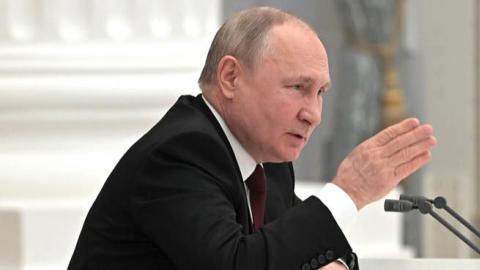Vladimir Putin's renewed assault on Ukraine’s sovereignty has intensified calls for democratic governments to target the Russian oligarchs whose luxury mansions, yachts, and mistresses are scattered across the West. Asset freezes and seizures and visa bans are among the measures suggested to sow dissent among Russia’s jet-setting elite and raise the cost of further aggression.
Designating certain Russian oligarchs is already part of the sanctions package announced by the Biden administration, which also includes blocking two large banks, further restrictions on Russian sovereign debt, and halting the already-suspended Nord Stream 2 pipeline. But these measures alone are not powerful enough to constitute an immediate deterrent to Putin.
The U.S. and its allies must now confound his expectations of Western weakness by inflicting crippling economic costs on Russia. The objective must be to ratchet unbearable financial pressure against the different factions within Russia’s political and business elite, compelling them to move against their wayward leader and thereby keeping Putin distracted with rolling internal threats to his own survival. This will take time to bear fruit and cannot be treated as a silver bullet to address the immediate crisis — but it is a key part of any medium- to long-term strategy to counter Putin’s revanchist campaign.
Putin spent much of his first decade in power wrestling with Russia’s powerful oligarchs, the ultimate “frenemies” who were given free rein to asset-strip the Russian economy so long as they refrained from challenging him politically. The most trusted of these, Putin’s so-called “wallets,” are also purported to hold the proceeds of Russia’s ruling criminal enterprise in trust, to be drawn upon as and when he chooses. For many, this dangerous pact involves keeping themselves, their families, and their stolen wealth outside of Russia itself. Here in the West, they have become the familiar faces of Russian malign influence, ingratiating themselves with political and business leaders and whitewashing Russia’s reputation by funding cultural and educational institutions.
This is the model of Russian kleptocracy that Western commentators are referring to when calling on policy-makers to “sanction the oligarchs,” in the belief that this would impel the latter to suddenly turn, like starving rats, on Putin himself. But after years of political maneuvering, imprisonment, and assassinations, Putin has not only decimated Russia’s democratic opposition but gradually shifted his own power base to reduce his vulnerability to palace coups.
The so-called siloviki and others who emerged from Russia’s security apparatus alongside Putin have embraced his Soviet nostalgia, nationalist rhetoric, aspirations to autarky, and revanchist foreign policy. They are just as corrupt as the oligarchs of yesteryear, but their survival is tied to Putin personally, and their wealth is not as internationally exposed. In short, the strongmen who now prop up Putin and project his twisted will from within the Kremlin are not only less vulnerable to Western sanctions and law enforcement, but they jeeringly welcome them as a mark of loyalty.
Putin has transformed Russia into a war economy since first invading Ukraine in 2014, building up some $630 billion in foreign reserves to weather the potential effect of sanctions. Living constantly during that time under the threat of U.S. sanctions, Russia’s elite would have been foolish not to similarly try to safeguard their personal wealth, meaning that much (but by no means all) that was once flaunted in London or Miami may now be hidden in Dubai or other offshore havens beyond the immediate reach of U.S. law enforcement.
In fact, Putin himself explicitly encouraged Russia’s wealthy elite to repatriate their assets in recent years, under the absurd banner of patriotism. Of course, trying to reverse Russia’s illicit capital flight increases the financial resources potentially at his disposal, but it also renders his preferred power base less vulnerable to international sanctions (and presumably less likely to cause trouble for him if they are targeted).
Meanwhile, the non-oligarchic business elites who are most exposed to possible Western sanctions appear to have no immediate influence in Putin’s increasingly authoritarian security state. As one told the Moscow Times anonymously, “We are wealthy and have a lot to lose. A lot of us have second homes in Europe, we have residency permits in the West, so we are heavily invested in this.” Yet these frustrations have so far manifested only in fear and silence.
The invasion of Donetsk and Luhansk should trigger immediate U.S. sanctions on Russia’s financial sector; a block on Russia importing microchips and other vital technology; and a final end to Nord Stream 2, which now appears to have been taken care of by Germany itself. But as former arms-control envoy and senior treasury official Marshall Billingslea has argued, a coherent U.S. approach would also include sanctions against Russia’s significant trade in non-energy products such as metals, machinery and equipment, and chemical products.
Putin and his inner circle are the only ones who aspire to Russian autarky. For oligarchs, business leaders, and indeed the wider Russian population, these measures to set Russia adrift from the global economy will soon cause inconvenience, eventually hardship, and ultimately discontent with Putin’s rule.
In terms of pursuing the oligarchs, this begins with an expansive approach to targeted designations against Putin’s “wallets” and the broader constellation of business elites aligned with his rule. The more these can be aligned with allies, the better, but as overseer of the global reserve currency, the U.S. is in a unique position to make unilateral impact and should not hold back for the sake of appearances of solidarity.
But sanctions are only half the picture. Putin’s rule is a transnational criminal enterprise and should be treated much in the same way that the U.S. has approached Venezuela’s kleptocracy. This means using the unique jurisdictional reach afforded by the U.S. dollar to launch major cross-border intelligence and law-enforcement investigations. The prospect of being extradited to the U.S. to face justice terrifies the Chavistas and will have the same effect on Putin’s henchmen.
Meanwhile, the U.S. and its allies must accelerate reforms that help make sanctions enforceable, such as requiring shell-company transparency and extending anti–money laundering responsibilities beyond traditional banks to include lawyers, fund managers, real-estate professionals, and others routinely implicated in Russian schemes. Democracies must also provide more protection for journalists and researchers working to uncover Russian corruption within our societies, especially by ending oligarchs’ prolific use of vexatious lawsuits to deter and impoverish opponents.
Putin may have reduced his vulnerability to oligarchic power plays, but he has not yet succeeded in creating an invulnerable totalitarian regime. By crippling Russia’s economy and pursuing a maximum-pressure campaign against the Russian elites who prop Putin up, the U.S. and its allies can eventually put his regime in danger.
Read in National Review















